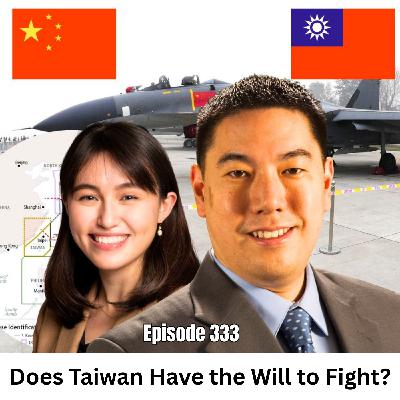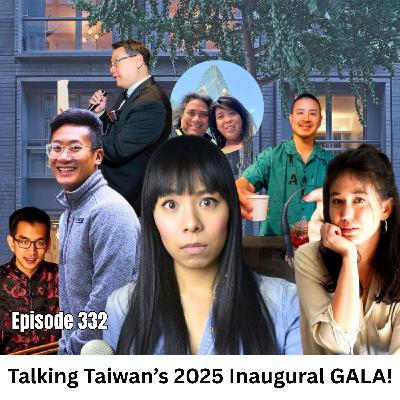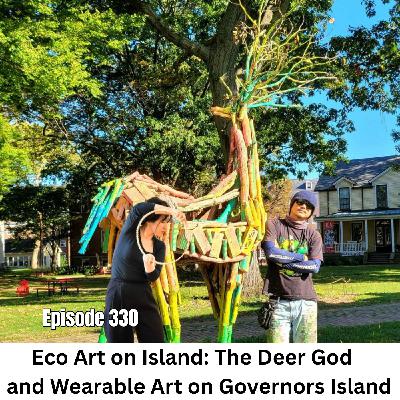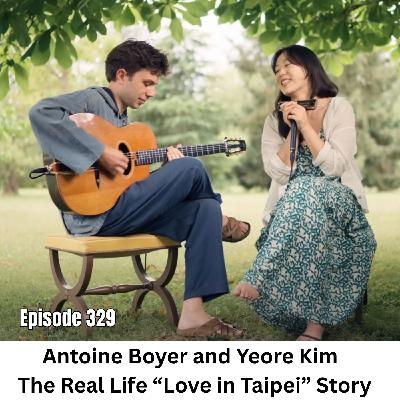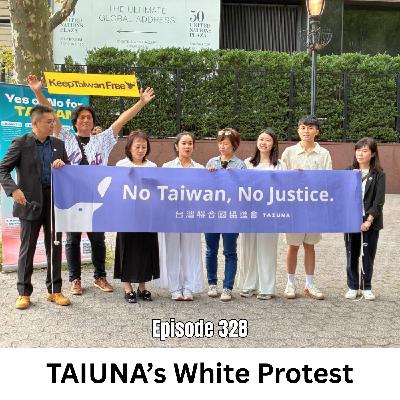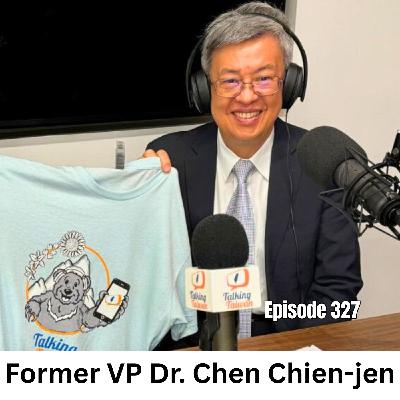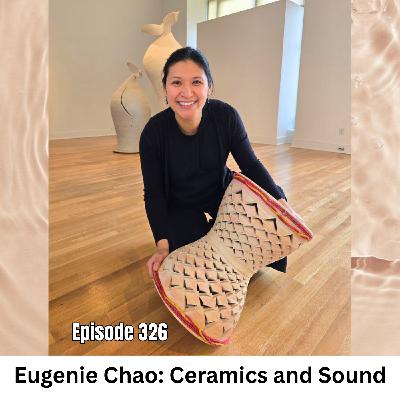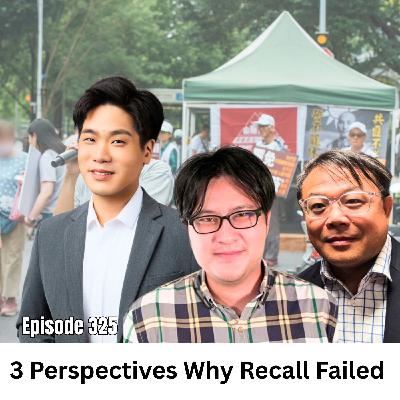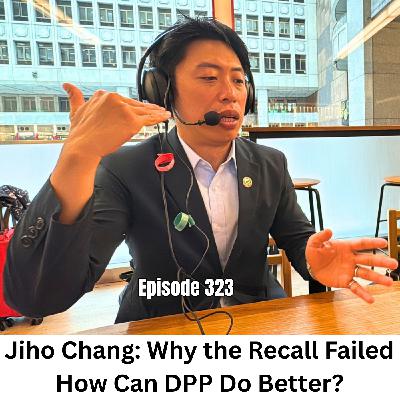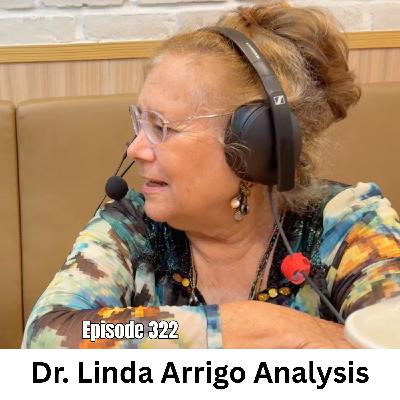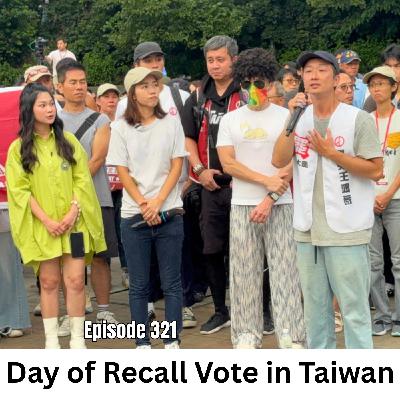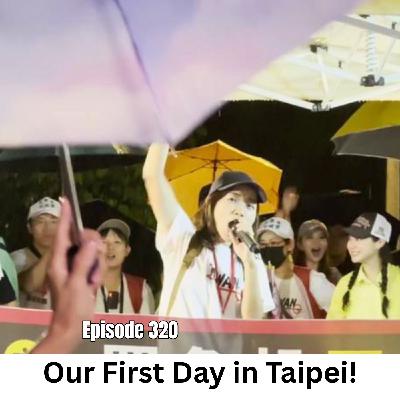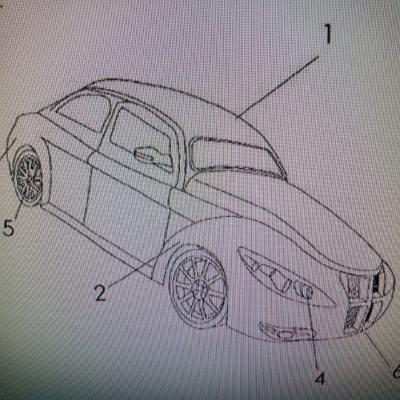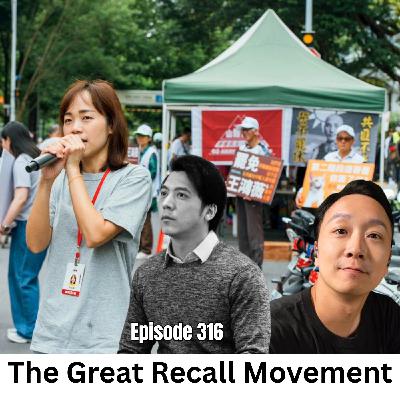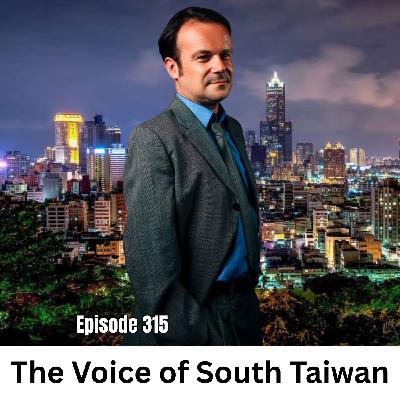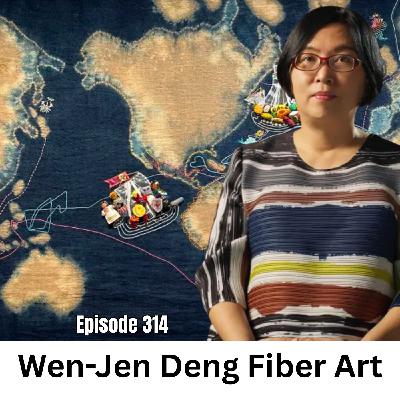Discover Talking Taiwan
Talking Taiwan

Talking Taiwan
Author: Felicia Lin
Subscribed: 50Played: 1,126Subscribe
Share
© Copyright 2013-2025
Description
Talking Taiwan is a Golden Crane Podcast Award Winner, and has been shortlisted in the 2024 International Women's Podcast Awards "Moment of Visionary Leadership" category. In 2025, it was nominated for the 12th Annual T.O. Webfest Awards in the category of "Best Ensemble Cast in a Podcast". Hosted by Felicia Lin, Talking Taiwan is the longest running, independently produced Taiwan-related podcast that covers political news related to Taiwan and stories connected to Taiwan and Taiwan's global community. To learn more about Talking Taiwan visit: www.talkingtaiwan.com
305 Episodes
Reverse
I recently sat down with Dr. Raymond Kuo, Director of RAND's Taiwan Policy Initiative and Catherine Kish, Research Assistant and Chinese Language Specialist at RAND to talk about their War on the Rocks article, "Taiwan's Will to Fight Isn't the Problem." Related Links: https://talkingtaiwan.com/does-taiwan-have-the-will-to-fight-ep-333/ Later on in the interview we also talked about how Taiwan could leverage its diaspora. Related Links: https://talkingtaiwan.com/does-taiwan-have-the-will-to-fight-ep-333/
Get Access to the Replay of the Talking Taiwan Gala Make a Donation at Humanitix https://events.humanitix.com/talking-taiwan-2025-fundraising-gala For Free Access the Replay of the Talking Taiwan Gala Give Us Your Feedback by emailing podcast@talkingtaiwan.con with the Subject Line: 12 MORE Talking Taiwan's inaugural fundraising gala was on April 30th here in New York City at the elegant Eichholtz showroom in Chelsea. The gala was a celebration of Taiwanese American cuisine, culture and community. We had Peter Lin's AAPI Jazz Collective perform, and food catered by 886 Restaurant, DAE tea and Taiwan Beer. It was a memorable, magical night and if you're wondering what you missed out on it, don't worry, later on in the episode I'll be sharing how you can watch the replay that we made of the event. We'll also share the Humanitix link where you can make a donation to watch the replay of the Talking Taiwan Gala. At the gala I interviewed comedian Esther Chen, Thomas Duh of DAE Tea, artist Kaarina Chu MacKenzie, and Jonny Lee, President of TAP-NY (Taiwanese American Professionals- NY chapter). And that's what we'll be sharing in this episode. Related Links: https://talkingtaiwan.com/talking-taiwans-2025-inaugural-fundraising-gala-ep-332/
Dr. Yang Szu Pang (楊斯棓) is an author and speaker. He has donated 100% of his books royalties to causes and organizations that he cares about. He has been invited to speak at several Taiwanese American conferences and communities across the country. In July of 2024 he sat down to speak with at the Taiwanese American Conference East Coast which was held at Westchester University. We talked about a broad range of topics from how to be financially prepared to care of aging, ailing parents to his most recent book, It Only Takes One, where the title of the books comes from and how it's related to Hsiao Bi-khim, the current the Vice President of Taiwan. Special thanks for translation assistance provided by Dr. Lee-Yuan Liu. This episode is sponsored in part by the Taiwanese American Council of Greater New York. Related Links: https://talkingtaiwan.com/author-and-speaker-dr-yang-szu-pang-%e6%a5%8a%e6%96%af%e6%a3%93-dont-think-youre-too-small-to-make-a-difference-ep-331/
Wang Guo-ren's deer sculpture measures well over 10 feet if you include its antlers. Constructed completely of fallen pieces of wood and tree branches that have been colorfully painted, the deer seems to have magically taken up residence on the lawn outside of the Taiwanese American Arts Council House 17. Related Links: https://talkingtaiwan.com/eco-art-on-island-the-deer-god-and-wearable-art-now-at-governors-island-house-17-ep-330/ Inside of the house we spoke with Julia Hsia about her exhibit "Wear Enough" which includes artifacts made with paper and receipts. In September we ventured over to Governors Island to meet artists in residence Wang Guo-ren and his sculpture entitled the Deer God, and Julia Hsia. This year's house theme is Eco Art on Island and as you hear at the beginning of the episode we were outside with the lovely sounds of nature like birds, and the more than occasional airplane flying overhead, many of which had to be edited out. Special thanks to Julia Hsia for helping to translate for Guo-ren at the beginning of the episode, before we moved indoors to interview her. Related Links: https://talkingtaiwan.com/eco-art-on-island-the-deer-god-and-wearable-art-now-at-governors-island-house-17-ep-330/
In this episode, the husband-and-wife team, gypsy jazz and classical guitarist Antoine Boyer and chromatic harmonica player Yeore Kim shared about their real life "Love in Taipei" story. He's from France and she's from South Korea, so music was their first common language. We also talked about how they navigate their partnership as life partners and as musical partners, and their debut duet album You and I. If you'd like to know more about Antoine you can check out Kaju's in-depth interview with Antoine on YouTube Related Links: https://talkingtaiwan.com/the-real-life-love-in-taipei-story-virtuoso-musician-couple-antoine-boyer-and-yeore-kim-ep-329/
On Friday, September 12th at the Dag Hammarskjöld Plaza which is across from the UN Headquarters, in New York representatives from the Taiwan United Nations Alliance or TAIUNA, an NGO from Taiwan, held a press conference urging the UN to include Taiwan in its system. TAIUNA Youth Representatives performed a dance, a white protest of Taiwan's exclusion from the UN. Related Links: https://talkingtaiwan.com/taiunas-white-protest-of-taiwans-exclusion-from-the-un-ep-328/ September is when the UN General Assembly takes place and delegates from TAIUNA have been coming to New York for the past twenty years to call for Taiwan's membership in the UN. This year is the 80th anniversary of the United Nations and the 80th session of the United Nations General Assembly. The General Assembly High-level Week runs from September 22-30th. The following day, Saturday, September 13th was the UN for Taiwan rally and march which has been organized by the Taiwanese American Council of Greater New York since 1992. The annual press conference and UN for Taiwan Rally are reminders of Taiwan's long-standing isolation from the international community. Related Links: https://talkingtaiwan.com/taiunas-white-protest-of-taiwans-exclusion-from-the-un-ep-328/
In July of 2024, we brought talking Taiwan to the 53rd annual Taiwanese American Conference, east Coast at Westchester University, where I had the pleasure and honor of interviewing Taiwan's, former vice President, Dr. Chen Chen (陳建仁). We talked about how Dr. Chen was trained to be an epidemiologist and was initially reluctant to go into politics, but then fate intervened and changed his mind when SARS hit Taiwan in 2003, and his experience handling the SARS outbreak as Taiwan's Minister of Health played an important role preparing him to deal with the COVID-19 pandemic as Taiwan's Vice President. Related Links: https://talkingtaiwan.com/dr-chen-chien-jen-former-vp-of-taiwan-reflects-upon-his-life-in-politics-and-as-a-public-servant/ I asked Dr. Chen why it's important for Taiwan to be a member of the WHO World Health Organization and about the challenges he's faced as the Vice President and Premier of Taiwan. how he overcame them and why he decided not to run as Vice President with Tsai Ing-wen for a second term. And finally, for some context, at the time of the interview, the Bluebird movement had emerged in Taiwan a month and a half earlier. I touched upon this with Dr. Chen briefly at the end of the interview. At the time, more than a hundred thousand people in total had taken to the streets of Taiwan in a series of massive protests. It was a very public objection to controversial bills passed by Taiwan's opposition controlled Legislative Yuan. After interviewing Dr. Chen, I was left thinking if only the world had more politicians like him with a public service mindset, the world would be a better place. This episode is sponsored in part by the Taiwanese American Council of Greater New York. Related Links: https://talkingtaiwan.com/dr-chen-chien-jen-former-vp-of-taiwan-reflects-upon-his-life-in-politics-and-as-a-public-servant/
In this episode of Talking Taiwan we sat down to speak with Eugenie Chao who describes herself as Taiwanese American maker, educator, and musician who works in the intersection of ceramics, sound, and history. Her exhibit at the Taiwanese American Arts Council House 17 on Governors Island aptly named Listening Vessels, features ceramic objects turned musical instruments created by Chao and is on display until September 7th. Related Links: https://talkingtaiwan.com/working-in-the-intersection-of-ceramics-sound-and-history-taiwanese-american-maker-eugenie-chao-ep-326/ Here's a little preview of what we talked about in this podcast episode: What came first for Eugenie music or working with clay? What made her combine ceramics with music? Where did that idea come from? How did she get interested or start working with clay? Eugenie's musical training and what instruments she plays? What was her early artwork like? How her artwork has evolved over time? What does it mean to work at the intersection of ceramics, sound, and history? What is her creative process is like? How sound affects her artwork? How she decides the size of the objects she creates? The challenges involved with making large scale pieces vs pieces that can be made by hand How does the size of an object affects the sound it makes The ceramic instruments from ancient cultures that inspire her, how she discovered them and what was their purpose What inspires you? Where do you get your inspiration? Eugenie's connection to Taiwan How Eugenie considers herself a maker and not an artist What can we expect to see and experience from Eugenie's Listening Vessels exhibit at the TAAC house on Governors Island The most ambitious or challenging piece of work that Eugenie has made How Eugenie deals with a creative block Eugenie's future projects can we expect to see from you? Related Links: https://talkingtaiwan.com/working-in-the-intersection-of-ceramics-sound-and-history-taiwanese-american-maker-eugenie-chao-ep-326/
When we decided to travel back to Taiwan to cover the vote to recall 24 KMT legislators on July 26th we had no idea how things would turn out. The Great Recall (or da ba mian) as it came to be known in Taiwan, was notable not just because it led to a record number of 31 KMT legislators in total being put up for a recall vote. What was most impressive about is that it was a nationwide effort that started at a grassroots level by everyday people. Related Links: https://talkingtaiwan.com/3-perspectives-in-taiwan-why-the-great-recall-failed-ep-325/ It's been incredible to watch everything leading up to the Great Recall. Going back to last May in 2024 during what came to be known as the Bluebird Movement when tens of thousands of people and upwards of 100,000 took to the streets of Taiwan in a series of protests against controversial bills proposed in the legislative yuan. What happened during the Bluebird Movement protests is said to be what in part galvanized citizens to organize the recall campaigns. I can't deny that our hopes were high for the results of the July 26th recall vote and after we learned that none of the KMT legislators were successfully recalled, we did our best during the remaining days of our time in Taiwan to try to make sense of the results by talking to a number of our friends and peers. What you'll hear in this episode are some sound bites from conversations we had on July 30th with Rath Wang, Safe Spaces Senior Policy Fellow and Dennis Chen, Chairman of Wikimedia Taiwan. They shared their observations and thoughts on why the recalls failed, the recall campaigners and what the results of the recall vote could mean for President Lai. Later that day I also spoke with Morrison Lee a Taiwanese businessman who went to China on what was supposed to be a 48-hour trip and ended up getting detained and stuck there for nearly 4 years. Morrison talked about his personal involvement in the recall effort also shared his thoughts on why the recall votes failed. As mentioned, recall campaign groups succeeded in putting up a total of 31 KMT legislators for a recall vote. Another 7 legislators will be up for a recall vote on August 23rd. Related Links: https://talkingtaiwan.com/3-perspectives-in-taiwan-why-the-great-recall-failed-ep-325/
As part of our great recall coverage in Taiwan, on July 25th the day before the vote to recall 24 Kuomintang (KMT) legislators, we sat down to interview A-Mei the spokesperson for the Shān chú wēi hài (山除薇害) recall group. We talked about why she got involved in the recall effort, how she got doxed by the Kuomintang (KMT) and how the recall effort was supported by overseas Taiwanese in over 38 cities from over 20 different countries. We previously interviewed three recall campaigners from this group- Carol, Eric and Acho in episode 316. We were also with A-Mei and the recall group on the day of the recall vote July 26th to watch the results of the recall vote. Special thanks to Mei-Ling Lin for her translation assistance. Related Links:
This is a part of our continued coverage of Taiwan's Great Recall. On July 26th, the people of Taiwan voted on whether or not to recall 24 Kuomintang KMT legislators from all across the island. None of the 24 KMT legislators were recalled. This was a blow to the Democratic Progressive Party that could have benefited from a rebalancing of the legislative yuan since it only has 51 of the 113 seats in the legislative yuan or congress. Among the concerns that motivated these civil society recall groups to take action were the unchecked visits of KMT legislators with high level officials in China. In April of 2024 KMT caucus convener Fu Kun-chi led a delegation of 17 KMT legislators to China where they met with the head of China's United Front. When asked the delegation has not been transparent about what was discussed in the meetings with Chinese officials. Two days after the recall vote, on July 28th , I sat down with Jiho Chang, Keelung City Councilor who shared how he faced a retaliatory recall by the KMT. He discussed his thoughts on the outcome of the July 26th recall vote and what this means for the DPP. On August 23 another 7 KMT legislators will be put up for a recall vote. Related Links:
On July 27th the day after Taiwan's island wide historic recall vote of 24 Chinese Nationalist Kuomintang (KMT) legislators, I sat down with Linda Gail Arrigo, Ai Linda (艾琳達) to reflect on the results of the recall vote, and the impact of the civic mobilization behind the recall effort. Related Links:
On July 26th the day of the historic vote to recall 24 Kuomintang (KMT) legislators we were with the Shān chú wēi hài (山除薇害) recall group in Taipei at Rongxing Garden (榮星花園) Rongxing garden, which is more like a park, for a sort of watch party with about a hundred volunteer recall campaigners. The recall vote results were being televised live on a series of oversized screens that had been set up in the park. When we finally learned the results of the recall vote It was a shock. 0 of 24 legislators had been recalled. What a sad, disappointing day. I could see it in the faces of the recall volunteers and at the same time it was touching to see how they consoled each other as some could help but burst into tears. The leaders of the recall group asked everyone to join hands and to form a circle in a sign of solidarity and encouragement Carol and Eric shared their initial thoughts with us. Related Links:
On our first day in Taiwan July 25th we went into the streets of Taipei where recall campaigners from the the Shān chú wēi hài (山除薇害) recall group were doing a last minute push asking people to get out and vote for the recall of 24 KMT legislators on July 26th. Related Links: https://talkingtaiwan.com/first-day-in-taipei-day-before-the-great-recall-ep-320/ We previously interviewed 3 recall campaigners from this group- Carol, Eric and Acho in episode 316. Eric explaining the meaning behind the recall group's name. Later that day we sat down to interview A-Mei the recall group's spokesperson who was doxed by the Kuomintang. We will be releasing our full interview with A-Mei at a later date so stay tuned for that. We ended the night at a recall campaign rally so spirited that you'd never guess that we were all standing in the pouring rain getting soaked. Related Links: https://talkingtaiwan.com/first-day-in-taipei-day-before-the-great-recall-ep-320/
Summer is upon us and I'm sure that a lot of our listeners especially those in New York will be happy to know that Taiwanese Waves will be returning to Central Park's Summer Stage on August 3 at the Rumsey Playfield. Doors open at 5:00pm Since 2016 Taiwanese Waves has introduced Taiwanese music to audiences at Central Park's Summer Stage. If you're not familiar with Taiwanese Waves you're in for a treat. In this episode I sat down with Mia, the main organizer of Taiwanese Waves and we are about to walk through and give you a taste of all of the acts that have performed at Summer Stage in the past nine years. You'll also get to hear a preview of what to expect at this year's concert. Related Links:
In late June, we met up with YouTuber Bā Jiǒng (八炯) when he was in New York. If you're not familiar with Bā Jiǒng you might want to check out 2 of his most popular videos which expose China's United Front's tactics to target the Taiwanese and to recruit Taiwanese influencers to attack and spread disinformation about Taiwan. Then you'll know why he's had death threats. Related Links: https://talkingtaiwan.com/meet-taiwanese-youtuber-ba-jiong-%e5%85%ab%e7%82%af/ Bā Jiǒng is among those spearheading the recall of Fu Kun-chi, the KMT legislator known as "The King of Hualien." Fu Kun-chi is 1 of 24 Kuomintang KMT legislators who will be up for the mass recall vote in Taiwan on July 26th. To get up to speed on the Great Recall Effort that's been happening in Taiwan checkout our past 2 episodes 316 and 317. Talking Taiwan is getting ready to head back to Taiwan to cover this historic mass recall vote of 24 KMT legislators, in fact we might already be there by the time you hear this episode. We look forward to having Bā Jiǒng on Talking Taiwan to talk about the recall efforts in Hualien and his videos exposing how the United Front works with Taiwanese influencers Special thanks to Winston Liao for connecting us with Bā Jiǒng. Related Links: https://talkingtaiwan.com/meet-taiwanese-youtuber-ba-jiong-%e5%85%ab%e7%82%af/
In Taiwan recall bids have been filed against 35 of the 39 Chinese Nationalist Party (the Kuomintang or KMT lawmakers who were directly elected to the legislative yuan in January, 2024. Recall campaigners have said that they want to restore order to Taiwan's legislative yuan, by removing pro-China KMT legislators who have passed amendments to expand the legislature's powers, undermined Taiwan's constitutional order by paralyzing the constitutional court, cut budgets and made Taiwan vulnerable to infiltration by the Chinese Communist Party. Related Links: https://talkingtaiwan.com/the-great-recall-explained-by-courtney-donovan-smith-ep-317/ Just a few days ago we learned that a total of 31 KMT legislators will be up for a vote to be recalled from office. 24 on July 26 and another 7 on August 23. Since my interview with 3 recall campaigners in episode 316, I thought it would be good to follow up with an explainer video with political commentator and analyst Courtney Donovan Smith about how the recall mechanism in Taiwan works and what led to this mass recall effort. And in a few days from now our two-person team will be heading back to Taiwan to witness and cover the July 26th recall vote. History is being made in the only way it can be in a vibrant democracy like Taiwan! Here's a little preview of what we talked about in this podcast episode: How the recall mechanism works in Taiwan Past cases of politicians who have faced a recall vote Factors leading to the Bluebird Movement and Recall Efforts The expanded powers of the legislative yuan that were ruled unconstitutional What happened to paralyze Taiwan's constitutional court What has motivated the people campaigning to recall KMT legislators Why the KMT's recall efforts against DPP legislators have failed How Ko Wen-je's supporters have reacted to his detainment due to corruption charges DPP involvement with recall efforts How some of the Kuomintang KMT have shifted from being anti-Communist China to pro-Communist China (PRC) The historical significance of Taiwan's mass recall votes of legislators If the DPP is behind the recalls of KMT legislators What happens next after the recall vote The impact of the Sunflower Movement Related Links: https://talkingtaiwan.com/the-great-recall-explained-by-courtney-donovan-smith-ep-317/
Have you heard about the great recall movement that's happening in Taiwan? What's it all about? Related Links: https://talkingtaiwan.com/the-great-recall-movement-effort-in-taiwan-boots-on-the-ground-ep-316/ 24 lawmakers, or legislators from the Chinese Nationalist Kuomintang KMT party are being put up for a recall vote. I don't think the world has ever seen anything like this happen on a national level in a democracy- 24 lawmakers being recalled from office, and that number is likely to be even higher at the time that this episode gets released. It's truly unprecedented! This recall vote certainly didn't happen overnight. It was through dedicated grassroots efforts, of the everyday people of Taiwan. Questions have been raised as to whether the recall efforts are a partisan politically motivated effort on the part of the Democratic Progressive Party to oust KMT legislators. That's what I wanted to get to the bottom of in this episode as I talked to some of the volunteers who have been boots on the ground in Taiwan's recall effort. As you'll hear in this episode, what's happening in Taiwan is a historic demonstration of the will of the people to exercise their rights in a democracy. The island-wide effort in Taiwan to recall lawmakers has been going on since last year and I sat down to speak to three volunteers Carol, Acho and Eric about how this mass movement has successfully gone through two stages, first signatures from1% of eligible voters in a legislator's district must be collected to initiate a recall. Then in the second stage signatures from 10% of eligible voters in a legislator's district must collect to in order for a recall vote to proceed. The hard part is that the signatures on the 1% and 10% petitions cannot be the same. On July 26 Taiwan's Central Election Commission (CEC) will hold recall votes for now possibly even more than 24 KMT lawmakers. Special thanks to Julien Oeuillet the Founding Editor of IPON (the Indo-Pacific Open News) for his help in making this interview possible. Here's a little preview of what we talked about in this podcast episode: What the recall movement that's happening in Taiwan is about Why and how Acho, Carol and Eric volunteer their time and energy in the effort to recall legislators How the recall efforts are targeting pro-CCP Chinese Nationalist Kuomintang KMT legislators How the recall is necessary so that Taiwan's parliament/legislature can function normally How the first volunteers for the recall met through a LINE group How what happened after the Bluebird Movement protests motivated people to attempt to recall KMT legislators How the Sunflower Movement compares to the recall movement How they vetted volunteers from outside of Taiwan who wanted to help with the recall effort in Taiwan How they dealt with people trying to infiltrate the recall volunteer groups How the recall effort got started with 10 volunteers and has grown to 500 volunteers globally How A-Mei one of the lead recall movement volunteers was targeted by the KMT who accused her and revealed her personal information and identity How the Taiwanese people feel they are at risk of losing their country to pro-CCP KMT legislators How the KMT has smeared and sued recall movement volunteers including Carol How the KMT has broken up recall movement volunteer groups How Carol has put her job on hold to be dedicated to being a leader of her recall movement volunteer group full-time What Carol does as leader of her recall movement group How Acho volunteers for the recall effort by editing and creating videos How Eric volunteers for the recall effort by dealing with the media The types of videos they produce to promote and create awareness of the recall effort How the majority of recall volunteers are women (60% women, 40% men) How over 100 recall volunteers are dedicated full-time to the effort How the women recall volunteers have been confronted by people who don't support the recall The standard for collecting signatures for the recall Why the KMT's efforts to recall DPP have failed due to forgery or signatures of the deceased on their recall petitions How the KMT is trying to paint the picture that the DPP are orchestrating the recall of KMT legislators How the recall effort is a grassroots effort not about conflict between the DPP and KMT political parties How there could be more than 24 KMT legislators put up for a recall vote The demographics of the districts that Carol, Eric and Acho are volunteers in for the recall How Acho and Eric balance volunteering for the recall effort with their day jobs How KMT legislators have not offered any explanation of what was discussed in a closed door meeting in 2024 with Chinese officials How public reaction to volunteers of the recall effort has changed over time How the recall volunteers now need to focus on encouraging the public to vote on July 26 How Carol encouraged creativity and idea of the recall volunteers that she manages How the sentiment of the recall volunteers is that we are all in this together How if eight to 10 KMT legislators are recalled there will be a better balance in the legislative yuan How Carol, Eric and Acho feel they are working selflessly for a common goal and that they are taking care of each other How this experience with the recall effort has helped Acho to see how the people of Taiwan can be so united How Carol has seen many recall volunteers evolving How what is happening in Taiwan is important for Asia and other democracies in the world Related Links: https://talkingtaiwan.com/the-great-recall-movement-effort-in-taiwan-boots-on-the-ground-ep-316/
Julien Oeuillet is an independent journalist, who has produced content for Radio Taiwan International and TaiwanPlus. He is the Founding Editor of IPON the Indo-Pacific Open News. Related Links: https://talkingtaiwan.com/julien-oeuillet-the-voice-of-south-taiwan-shines-a-spotlight-on-kaohsiung-ep-315/ Back in November of 2024 we interviewed Julien about a broad number of topics including: How he is very much at home in Kaohsiung How he got his start in broadcasting and media What he thinks makes a good and bad journalist especially in Taiwan How he focuses on putting a spotlight on Kaohsiung and southern Taiwan through his Radio Taiwan International show, The Voice of South Taiwan His documentary Taiwan's Little Big Friend about Luthania and its relationship with Taiwan Here's a little preview of what we talked about in this podcast episode: Why Julien saw the need to start IPON (Indo-Pacific Open News) Julien's upbringing How Julien got started in broadcasting and media How Julien was taken under the wing of veteran journalist and documentary filmmaker Philippe Dutilleul How Julien sees himself as a Kaohsiung resident How Julien has seen Kaohsiung transform How Julien thinks that Kaohsiung should receive more international attention Julien's Radio Taiwan International show, the Voice of South Taiwan What Julien thinks makes someone a good or bad journalist especially pertaining to Taiwan Julien's thoughts on English and education in Taiwan Julien's observations on the Taoist nature of people in Taiwan What is Taiwanese identity Julien's connection to Lithuania Parallels between Lithuania and Taiwan Julien's documentary, Taiwan's Little Big Friend If Lithuania will keep its Taiwan Representative Office Julien's thoughts on China's fear mongering Related Links: https://talkingtaiwan.com/julien-oeuillet-the-voice-of-south-taiwan-shines-a-spotlight-on-kaohsiung-ep-315/
We recently sat down with Wen-Jen Deng one of the artists in residence at the Taiwanese American Arts Council's House 17 on Governors Island and Ming Turner, curator of Wen-Jen's art exhibit :The Embedded Stitch- Contemporary Fiber Art, which is currently showing at Tenri Cultural Institute until June 28th Related Links: https://talkingtaiwan.com/a-conversation-with-wen-jen-deng-taiwanese-fiber-artist-and-curator-ming-turner-ep-314/ According to Deng's curator Ming Turner, "Deng is a core member of the influential Taiwanese artist collective, Hantoo Art Group. Her early works were primarily oil paintings which incorporated embroidery and collage using traditional Taiwanese floral fabrics. Deng often draws inspiration from Taiwanese food culture— her earlier pieces explored the island's distinctive betel nut culture, while more recent works have focused on everyday culinary traditions and the cultural heritage of the Sirayu Pingpu people." Special thanks to Ming Turner for translation assistance during this interview. Here's a little preview of what we talked about in this podcast episode: Wen-Jen's upbringing in Taiwan and how she knew she wanted to be an artist What Wen-Jen thinks an artist's role in the world is Why Wen-Jen studied art in France and how she was inspired by Marc Chagall How Wen-Jen started off doing oil painting as an artist How Wen-Jen switched from using oil paint as her medium to fiber and textiles How Wen-Jen worked in a textile shop making Chinese dresses while she was a student in France Why her early source of inspiration was food Her series of work that focused on lotus shoes and pig's hooves (pigs feet), betel nuts, and other everyday Taiwanese cuisine How Wen-Jen discovered her mother's was from the Siraya tribe during her 2017 residency at Soulangh Cultural Park in Tainan, and that inspired her to move her focus from food to indigenous culture How Wen-Jen learned indigenous weaving techniques How Wen-Jen's mother was a seamstress but Wen-jen did not pick out any of those skills from her mother How Wen-Jen taught herself to embroider when she was working in the textile shop in France How all of the embroidery and sewing on Wen-Jen's works are done by hand How in the process of weaving and embroidering Wen-Jen gets in a focused state of meditation The field work that Wen-Jen does related to her artwork Ming shared some of her thoughts on the significance of Wen-Jen's artwork Wen-Jen's artwork "Oyster Noodles" which will be on display at the TAAC Governors Island House 17 How Taiwan's transition from authoritarianism to democracy has impacted artists in Taiwan How artists in Taiwan get funded How Wen-Jen's sculptural piece which is shaped like the island of Taiwan and shows its topography will be displayed at the TAAC House 17 on June 21


